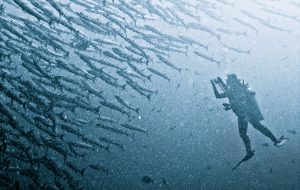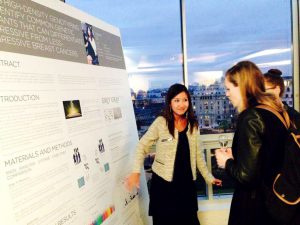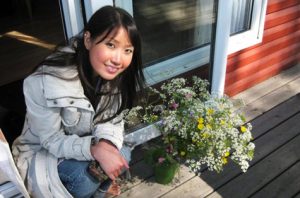Living Happy: An interview with USP Alum Li Jingmei
By Augustin Chiam
Augustin (Political Science + USP, Year 4) is a student writer for Highlights. He recently had a chat with Dr Li Jingmei, Scientist and USP Alum, Class of 2006, in her office at Biopolis.
If scientific research is a stressful endeavour, you would not be able to tell from looking at Dr Li Jingmei (Life Sciences + USP, Class of 2006). The USP alum has an infectious laughter and a glowing tan — presumably from the many diving trips which she makes in her spare time. Her personal motto: Live happy.

Dr Li’s career is testament to the notion that living happy and having success are not mutually exclusive. She was awarded the NUS Undergraduate Scholarship when she matriculated in 2001 and was named valedictorian of the Faculty of Science when she graduated in 2006. She was also awarded the A*STAR Graduate Scholarship and took the chance to go to Sweden for her post-graduate studies where she did research on breast cancer.
According to Dr Li, breast cancer research is easier to do in Sweden as compared to Singapore. The reason for this, she said, is that Sweden has a nation-wide centralised registry of patient’s medical records which spans a few generations. In contrast, the data in Singapore is decentralised, often owned by private hospitals, and the genealogy of a patient is not readily available.
“The thing is, I can stay in Singapore for the money but I won’t be very productive because of the red-tape.”

The most important thing about post-graduate research, Dr Li said, is not the money but finding a place that suits one’s passion and interest. That is exactly what she found at the Karolinska Institutet in Sweden.
“The research topic is secondary, it is about the people. Go and visit the lab, feel the atmosphere of the lab. If you like it, join it. But if you feel a sense of doom in the lab and everyone is scared all the time then don’t join it, because it’ll just kill your passion for science… I really liked the lab in Sweden, people were happy at work. There was an optimism and positivity in the lab.”
No wonder then that after seven years in Sweden, Dr Li is so eager to go back again. This time, she has a US$40,000 grant given as part of the UNESCO-L’Oréal International For Women in Science Fellowship. The grant is given in recognition of up-and-coming female researchers so as to encourage greater gender parity in the sciences. Dr Li is one of only 15 women scientists around the world this year to receive the Fellowship. For Dr Li, gender discrimination has not been an issue in her career so far. Nevertheless, there appears to be more men than women in management positions but she suggested that it might have more to do with time-lag than of structural discrimination — at least in Singapore.
“Back then, most of the men had education but women didn’t. So if you compare the numbers [now], of course it is not fair. You have to wait until the women catch up … but I think Sweden and Singapore are doing well in terms of encouraging gender equality in the sciences.”
When it comes to encouraging more women to pursue science, Dr Li is a believer of starting them young. Her own interest in the sciences was sparked when she was just a child and she never looked back.
“When I was young, my parents bought a set of encyclopaedic books but, for some reason, they refused to let me read it and put it on the top shelf. I used to climb up on to the top shelf and read the books. Because I had to go through so much trouble, I really enjoyed them.”
“They weren’t going to let me have it but I will have it [anyway],” she added with a laugh.
There does not seem to be any obstacles or fears that can stop Dr Li from getting what she wants. She candidly admitted that she started diving to confront her fear of water. And when she was an undergraduate in NUS, she spent half a year handling cockroaches as part of a research project even though she was squeamish about it at the start.

This spirit of adventure was also evident when she extended her undergraduate studies for one year to participate in the NUS Overseas College (NOC) programme in Silicon Valley, USA. For her, taking USP modules outside her area of specialisation (Life Sciences) was another part of that adventure.
“Every single [USP] course was quite quirky. For example, I remember an Engineering module where the exam went like this: There are nine dots, use four lines to join all the dots. I also remember this course by Associate Professor Syed Farid Alatas where we explored religious syncretism.”
Besides the interesting modules, Dr Li also remembers the numerous discussions with her peers in USP while they stayed together in Prince George's Park Residences (PGPR). Those were the days when USP did not yet have its own residential college. She still keeps in contact with many of these peers even though they had only taken one module together.
“It is about the interaction with [students from] the other faculties. I can imagine if you’re not in USP, you’re stuck with people from the same faculty unless you stay in a hall … people have different ways of solving the same problems.”
It has been some time since Dr Li graduated but speaking to her, you never hear the sense of jadedness and cynicism that one might expect from someone who has years of research under her belt. Instead, she still has that sparkle in her eyes and a seemingly unquenchable thirst for learning.
“I like to feel like a student all the time. I feel like I never grew up. People ask me: are you still in school,” she said with a hearty laugh.

